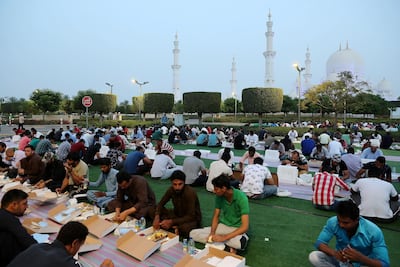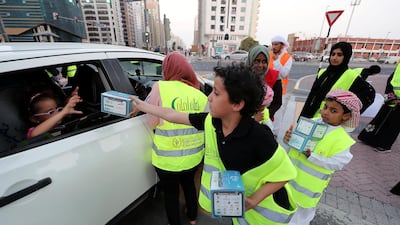Iftar meals will be directly delivered to those in need in the UAE this year, rather than being served at Ramadan tents or at mosques.
The change in delivery approach was made necessary to avoid crowding in areas, which is banned as part of measures to stop the spread of coronavirus.
On Wednesday, charity organisations said food parcels containing essential groceries – including rice, sugar, flour and canned goods - would be delivered to anyone struggling to feed themselves or their families this year.
Many people around the world have taken a financial hit this year, having had their salaries slashed or been asked to go on an early or unpaid leave. Some have also been let go by companies struggling to mitigate financial losses as a result of the pandemic.
This year, charities in the UAE have found new ways to help those in need without resorting to large gatherings at mosques.
These parcels will be delivered to homes instead. This is the first time Ramadan tents that fed the low-income workers is being abandoned since the formation of the UAE.
Dar Al Ber Society told The National it would provide 11,000 meals to people in Ras Al Khaimah, Ajman and Dubai this year.
“We are expecting a lot more since hotels too will have to donate through a charity," said Dr Hisham Al Zahrany, deputy director of Social Services at the society.
"The target is labour accommodation where a representative will go in and deliver the meals. And then there are those whose jobs have been affected by the curfews and the pandemic such as taxi drivers,” he said.
Shukoor Kallungal, president of Kerala Muslim Cultural Centre in Abu Dhabi, said they are expecting to distribute more than 700 food bags a day during Ramadan.
"With the current situation, it is not possible to make iftar meals, but we will be distributing groceries for the people [in need] to prepare food at home."

The centre is already distributing between 600 to 700 meals a day to low-income workers.
"We started 10 days ago, since the coronavirus difficulties started. Many people are sitting in their rooms without any salary or income, so we are trying to help them," he said.
The centre receives requests for food through their helpline. They began by distributing ready meals, but switched to groceries - with each bag containing basic foodstuff such as rice, chicken and eggs.
"We are trying to reduce cooked food meals and switch to groceries, to reduce social contact," he said.
"In Ramadan it is going to be very necessary to increase food bags. In the past, there were many Ramadan tents set up to provide food and in mosques but now, with the current situation, it is not safe to set them up and they won't be there any more.
"We are expecting a requirement for more than 700 [food bags] a day," he said.
On Wednesday, Emirates Red Crescent said it aims to help more than one million people through its charitable initiatives this Ramadan.
Their annual campaign would usually involve providing iftar meals to those in need at Ramadan tents set up across the country.
This year, the organisation will also be delivering food parcels to people to avoid crowding and adhere to social-distancing rules.
Other ERC programmes include Zakat Al Fitr, a charity undertaken at the end of Ramadan, and handing out clothes to those in need ahead of Eid Al Fitr - when Muslims typically wear new clothes to celebrate the "festival of breaking the fast".
Beneficiaries of this year's campaign will include members of vulnerable families and workers, reported state news agency Wam.
Sponsors of the campaign include Abu Dhabi National Oil Company, Abu Dhabi Islamic Bank, and Etisalat.
"We are preparing to start the best month of the year by strengthening the spirit of human solidarity and offering the opportunity to participate in our programmes around the country, which will benefit hundreds of thousands," said Rashid Al Mansouri, ERC deputy secretary-general for Local Affairs.

